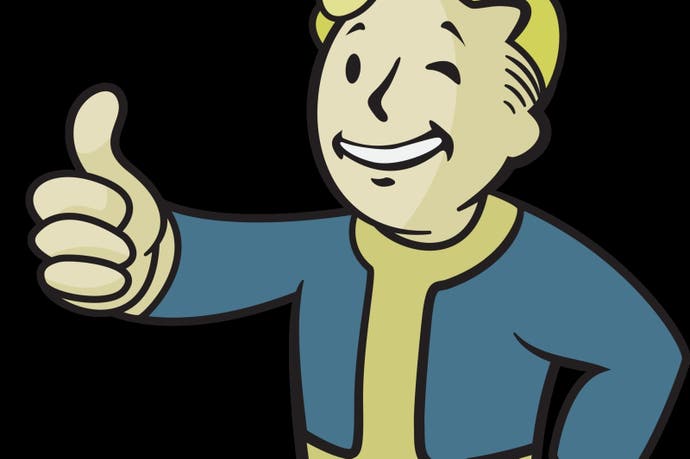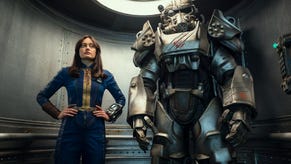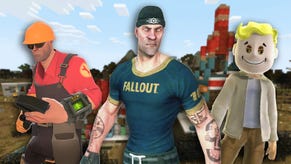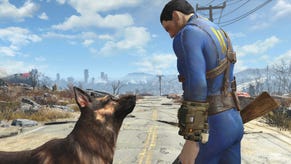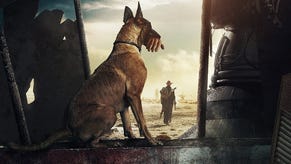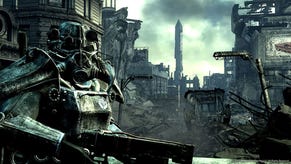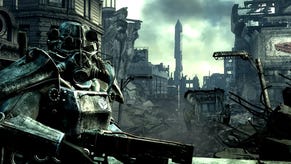Games of the Generation: Fallout 3
Nuclear holiday.
Over the next two weeks we'll be bringing you our pick of the games of the generation. Fallout 3's up today, and we take a look at Bethesda's brilliantly handled revival of the classic RPG series.
For many years the Fallout community was a strange place to lurk. An airtight vault, where denizens in musty blue uniforms would desperately bang on the inside of its thick metal door for attention. Day in. Day out.
They dreamt of a shared isometric past and the brown tint of forgotten wastelands. In truth, however, the prospect of the Van Buren project - a true Black Isle Fallout 3 - had died with the studio that created it.
Hope faded, and the water chip malfunctioned: the countdown to oblivion was well underway.
Their salvation was unexpected. Bethesda descended from upon high, and vowed to recreate Fallout in its own image. Underdog-rooters everywhere high-fived, Vault Boy gave a cheeky thumbs-up and there was much rejoicing.
The old guard Fallout faithful, however, feared 'Oblivion with Guns'. As it would turn out, perhaps, rightly so. The Bethesda takeover was like watching wads of foreign cash being injected into your favoured ailing football team - suddenly expected to play in front of bigger crowds, display fancier footwork and dispense with a long-maintained little-league mentality.
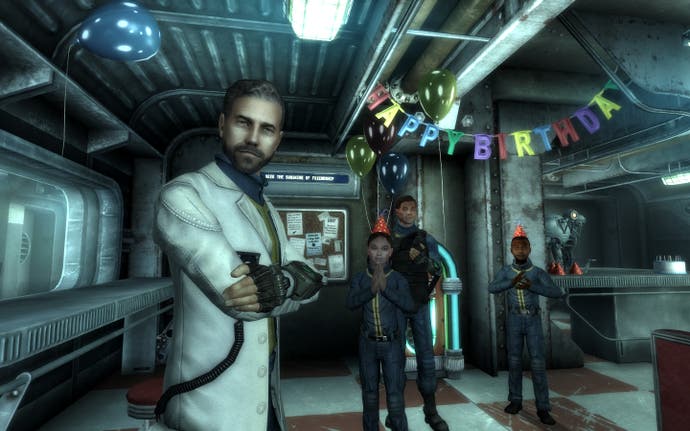
What people had rallied around for so long, through so much suffering, became an entirely different entity. The change was seismic: to say it lightly, Fallout die-hards were non-plussed, lost and angry but hang on... what's that noise?
"Bongo. Bongo. Bongo. I don't wanna leave the Congo! Oh no, no, no-no!"
Could it be?
"Bingo, bangle, bungle, I'm so happy in the jungle, I refuse to go!"
It is! It's me, sauntering over a beautiful apocalyptic ridge - listening to The Andrews Sisters, blowing Super Mutant heads in two with a Rivet gun and 100 per cent not giving a shit.
Fallout 3 was, in my exploding and increasingly dislocated eyes, a triumph. A perfect meld of the old and the new. The SPECIAL skills system was adopted and updated brilliantly, while the action points and live action freeze-frames of VATS gave a welcome taste of turn-based decision-making.
The floaty combat curse of so many roleplay games (Bethesda's former work very much included) was replaced by weight, heft and meaty explosions capable of turning bodies into physics-enabled dog food. Black Isle's systems were regrouted, scrubbed and cast to fit inside an Elder Scrolls-like sandbox framework. It elegantly disguised dice-rolls, buffs and all manner of +1ery with a fiction (and a PipBoy UI) that easily explained itself to the easily bewildered - such as myself.
"With all due respect to the night skies, murky dungeons and stunning vistas of Skyrim, the Capital Wasteland always had something interesting and different over its next irradiated hill - whichever direction you strode."
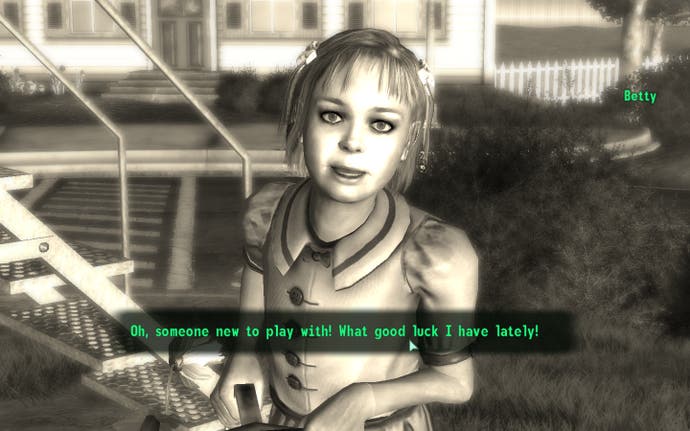
Most importantly, however, the original game's clash of perky Jetsons optimism and jarring apocalyptic violence was recreated perfectly. Fallout games take place in an Americana nuked in a retro-envisioned 2077, meaning that their commie-fearing ruins are just as fascinating as the maniacs who came about after the bombs dropped. When these worlds combine, a state of near-perfection can be achieved.
Fallout 3 made the most of this dichotomy through its cheery mascot Vault Boy and murderous variations on Forbidden Planet's Robbie the Robot, but doubled it down through tours of Vault-Tec survival systems in the Smithsonian and Tranquility Lane's take on a simulated Pleasantville.
Bethesda had fun. They knew that Fallout could tackle serious tales of survival and society while simultaneously relishing the inherent silliness of video-gaming. Freed from the tight faerie armor of Elder Scrolls, you could feel the development team revelling in Megaton, Rivet City and the Republic of Pete. For the creators it was a palate cleanser, and for the roleplayers tired of eldritch side-boob it was a tonic.
The joy of the game wasn't quite in your finger hovering over a big red button marked 'Megaton', it wasn't in mini-mushroom clouds appearing over exploding car wrecks and it wasn't in Liam Neeson. Instead, it could be found in your role as a lone wanderer.
We can all bemoan the one-note NPC dialogue and desultory climax, but Fallout 3's unparalleled sense of exploration, adventure and the unexpected more than makes it a game of the generation. With all due respect to the night skies, murky dungeons and stunning vistas of Skyrim (not to mention the tremendous mod support), the Capital Wasteland always had something interesting and different over its next irradiated hill - whichever direction you strode.
I don't know how many National Trust locations you were dragged around as a child, but what lies beyond Fallout 3's cliff-faces and charred motorways feel like the curios, follies and grottoes of a gallows humour stately home garden.
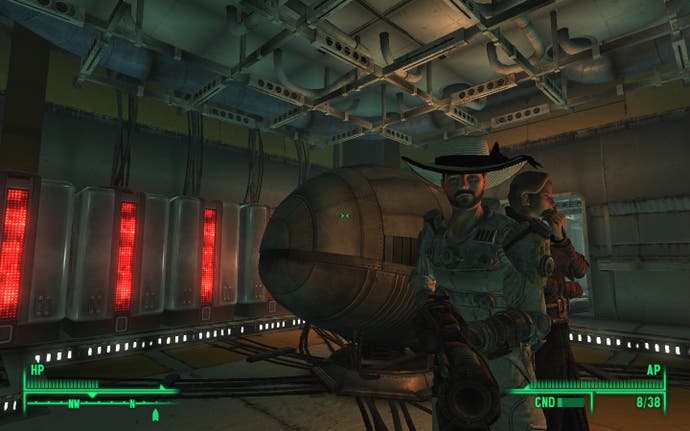
There's a true sense of discovery as you crest a hill and discover a downed alien spacecraft, meet the AntAgoniser or find a house that's been rigged with a complicated domino-based nuka-cola booby trap. Or maybe even find the corpse of a man who covered every surface around him with sink plungers before he died. It's a pop of exhilaration, and an experience that always feels personal to you. (Unless you just used Google to find Dogmeat, as we all did if we're honest...)
A constant theme of this generation has been old ideas and formats being recycled and repackaged. Every publisher has visited dusty back rooms to inspect what licenses had been accrued over the years - what brands they could reinvigorate, which older gamers to reel back in, how many HD remakes could be hastily chopped together and what consistency of freemium bullshit could be feasibly be forced down a single throat.
Fallout 3 however (alongside the likes of X-Com) came from the right place - a design team energised and invigorated by the approval of their teenage selves. It used the past as an intelligent stepping stone towards modern mass-appeal roleplay and, arguably, eased the passage of kickstarted re-apocalypses like Wasteland 2.
Today, even a half-thought dedicated to a post-Skyrim Fallout 4, running on the next generation consoles and modern PCs, can lead to a permanent and debilitating state of arousal.
Ron Perlman makes a habit of stating "War, war never changes" - it's his opening gambit at dinner parties. He must know, however, that it isn't true. War had to change, and Fallout had to change with it if it were ever going to survive outside the vault. The fans it left behind, the hardcore who thought it tainted by exposure to the outside world and cast it out, were saddened. That can't be denied. The way Fallout 3 strode out, blinked beneath an unfamiliar sun and went on to thrive, however, genuinely made it one of the greatest experiences of this generation.
Come friendly bombs, and Fallout 4...
